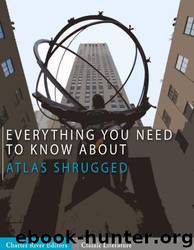Everything You Need to Know About Atlas Shrugged by Charles River Editors

Author:Charles River Editors
Language: eng
Format: mobi, azw3
Published: 2012-02-19T06:00:00+00:00
Collectivism Comrades
A secondary, but also large theme that looms throughout the novel is the notion that collectivism, or socialism as it is generally referred to, may be the root of the evils of society. Collectivism is often defined as the “personal or social orientation that emphasizes the good of the group, community, or society over and above individual gain.” Rand sets out to demonstrate through the novel’s action what happens when governments follow socialist ideas. She argues that this fake and forced moral code of collectivism/socialism that places the needs of one’s neighbors above one’s own rational self-interest is the cause of chaos and evil. Incentive is destroyed, and corruption becomes inevitable. Rand’s idea of greed being good is at the heart of this theme.
The example within the novel of the Twentieth Century Motor Company illustrates this collectivistic approach simply and cleverly. The Twentieth Century Motor Company of Starnesville, Wisconsin is a fictional business firm in the book. Specifically, this company built vehicle engines for more than twenty years until finally it went bankrupt and was liquidated. Subsequently, the original workforce, having noticed that the decay in the economy of the entire United States dated from their original vote for a disastrous collectivistic type business plan, came up with an expression in the form of a question that expressed not only their hopelessness but their despair. That coined epithetic question was, “Who is John Galt?”
After the plant adopted a method in which workers were paid according to phony needs and ordered to work based on zero ability not even close to mediocrity, the workers became full of themselves, each seeking to show himself or herself as most needy and least skilled. The plant failed, and the community was destroyed by the lack of anything substantial and accountable. For Rand, any business, economic, or political plan based on sacrifice of the individual for the group will always lead to chaos and destruction.
As individuals, Rand’s heroes will reject any demand for self-sacrifice. The novel is the story of a strike by “the men of the mind,” the producers, thinkers, and achievers. They protest the idea that they have to serve others and that the greater their ability, the greater the debt they owe. Those who joined the strike swore an oath, on their life and their love of it, that they would not live for the sake of others nor ask others to live for them. As John Galt’s states, “I swear by my life and my love of it that I will never live for the sake of another man, nor ask another man to live for mine." Ayn Rand understood that thought, choice, and actions are of the individual kind and should not be products of the collective group. Her heroic characters think for themselves, as Taggart, Rearden, and John Galt do.
Objectivism vs. Literary Art
When the book was published, it sold very well and was on the bestseller list. However, Rand and her friends had hoped the novel’s main concept
Download
Everything You Need to Know About Atlas Shrugged by Charles River Editors.azw3
This site does not store any files on its server. We only index and link to content provided by other sites. Please contact the content providers to delete copyright contents if any and email us, we'll remove relevant links or contents immediately.
4 3 2 1: A Novel by Paul Auster(12343)
The handmaid's tale by Margaret Atwood(7713)
Giovanni's Room by James Baldwin(7274)
Asking the Right Questions: A Guide to Critical Thinking by M. Neil Browne & Stuart M. Keeley(5722)
Big Magic: Creative Living Beyond Fear by Elizabeth Gilbert(5694)
Ego Is the Enemy by Ryan Holiday(5365)
The Body: A Guide for Occupants by Bill Bryson(5040)
On Writing A Memoir of the Craft by Stephen King(4896)
Ken Follett - World without end by Ken Follett(4691)
Adulting by Kelly Williams Brown(4540)
Bluets by Maggie Nelson(4522)
Eat That Frog! by Brian Tracy(4486)
Guilty Pleasures by Laurell K Hamilton(4398)
The Poetry of Pablo Neruda by Pablo Neruda(4072)
Alive: The Story of the Andes Survivors by Piers Paul Read(4003)
White Noise - A Novel by Don DeLillo(3983)
Fingerprints of the Gods by Graham Hancock(3968)
The Book of Joy by Dalai Lama(3951)
The Bookshop by Penelope Fitzgerald(3818)
